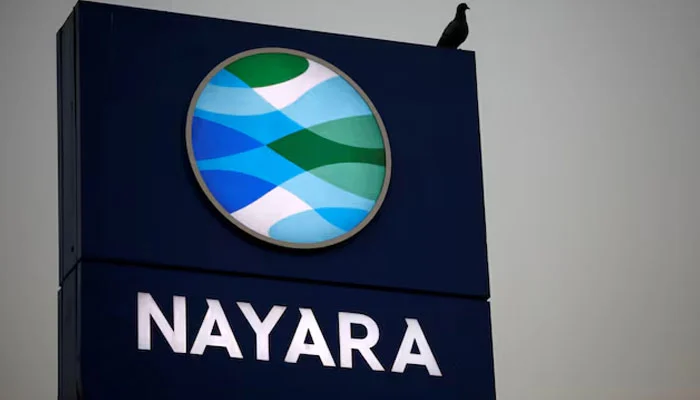Nayara Energy is facing a supply crisis after Saudi Aramco and Iraq’s state oil company SOMO suspended crude sales, industry sources revealed. This sudden halt in Gulf crude oil supply has left the Indian refiner, already under European Union sanctions, almost fully dependent on Russian shipments in August. The situation highlights the growing risks in Nayara’s crude oil imports strategy as geopolitical pressures tighten.
Sanctions Disrupt Flow
In July, the European Union imposed sanctions on Nayara Energy, a refiner majority-owned by Russian companies, including oil giant Rosneft. These sanctions created payment complications for crude purchases, particularly from Iraq. As a result, Nayara’s regular supply chain from the Gulf collapsed, cutting off its access to nearly three million barrels of crude each month.
Normally, Nayara imports about two million barrels of Iraqi oil and one million barrels of Saudi crude. However, shipping records confirmed that neither supplier delivered any shipments in August. The disruption forced the company to rely solely on Russia for its imports.
Reliance on Russian Oil
Shipping data from LSEG and Kpler showed that Nayara turned to Russia for direct supplies. An official from the Russian Embassy in New Delhi recently confirmed this arrangement, highlighting Moscow’s continued backing of the private refiner.
Despite the support, the dependency raises concerns about long-term stability. Russia has become Nayara’s lifeline, but overreliance on a single source leaves the company vulnerable to market fluctuations, logistical challenges, and shifting sanctions regimes.
Last Deliveries Before the Halt
The last Iraqi cargo for Nayara arrived on July 29. It was a shipment of Basra crude carried by the vessel Kalliopi, which discharged at Vadinar port. Similarly, Nayara’s last Saudi shipment was on July 18. That delivery, carried by the tanker Georgios, contained one million barrels of Arab Light alongside a matching volume of Basrah heavy crude. Since then, no Gulf cargoes have arrived.
This cutoff marked a turning point for Nayara, disrupting a steady supply relationship that had provided crucial diversity to its crude basket.
Read: Gold Prices in Pakistan Stay Firm at Record High
Refinery Operations Under Strain
Nayara runs a 400,000 barrel-per-day refinery at Vadinar in western India. Sources said the facility is operating at about 70–80% of capacity. The reduced output stems from difficulties in selling refined products, which became harder after sanctions discouraged mainstream shipping companies from working with Nayara.
To keep exports moving, the company has turned to the so-called dark fleet — vessels that operate outside conventional shipping norms to handle sanctioned or risky cargoes. While this workaround allows sales to continue, it also exposes the company to higher costs and legal risks.
Financial and Managerial Pressures
The sanctions have put financial strain on Nayara’s operations. Payment obstacles with SOMO underscored the growing difficulty of handling transactions with international suppliers. The lack of Gulf crude only compounds these problems, limiting flexibility in procurement.
Adding to the challenges, Nayara’s CEO resigned in July, leaving the company in a leadership vacuum at a critical time. Last week, the firm appointed a senior executive from Azerbaijan’s state oil company SOCAR as the new chief executive. The move signals an attempt to stabilize management and bring in expertise from another major oil-producing nation.
Role in India’s Energy Sector
Nayara controls about 8% of India’s refining capacity, making its stability crucial for the country’s energy landscape. With India’s refining sector handling 5.2 million barrels per day, Nayara plays a significant role in meeting domestic fuel demand and contributing to exports.
However, sanctions and supply halts could reduce its competitiveness. Other refiners, with more diverse crude sources, may find themselves in a stronger position compared to Nayara’s increasingly narrow supply chain.
Gulf Suppliers Step Back
Saudi Aramco and SOMO’s decision to halt supplies reflects caution about the risks associated with sanctions. For Gulf exporters, continued sales to Nayara could invite complications in financial transactions and shipping insurance. By stepping back, these companies avoid entanglement in potential disputes or restrictions.
Although neither Saudi Aramco nor SOMO commented officially, their withdrawal underscores the global impact of sanctions on commercial decisions. The Gulf suppliers’ absence also highlights how geopolitics increasingly shapes the flow of crude oil in Asia.
Future Outlook for Nayara
Nayara faces a complex road ahead. To sustain operations, it must balance its reliance on Russian oil with efforts to secure alternative suppliers. At the same time, it must navigate shipping hurdles, payment channels, and regulatory scrutiny.
The appointment of SOCAR’s executive as CEO suggests a possible pivot toward building fresh partnerships and learning from international practices. Whether this leadership change can offset supply risks remains uncertain.
For now, Nayara’s crude oil imports remain tightly tied to Russia. If sanctions expand or logistics falter, the company could face deeper disruptions. On the other hand, Russia’s willingness to step in may allow Nayara to sustain refining activity despite mounting obstacles.
Follow us on Instagram, YouTube, Facebook,, X and TikTok for latest updates
